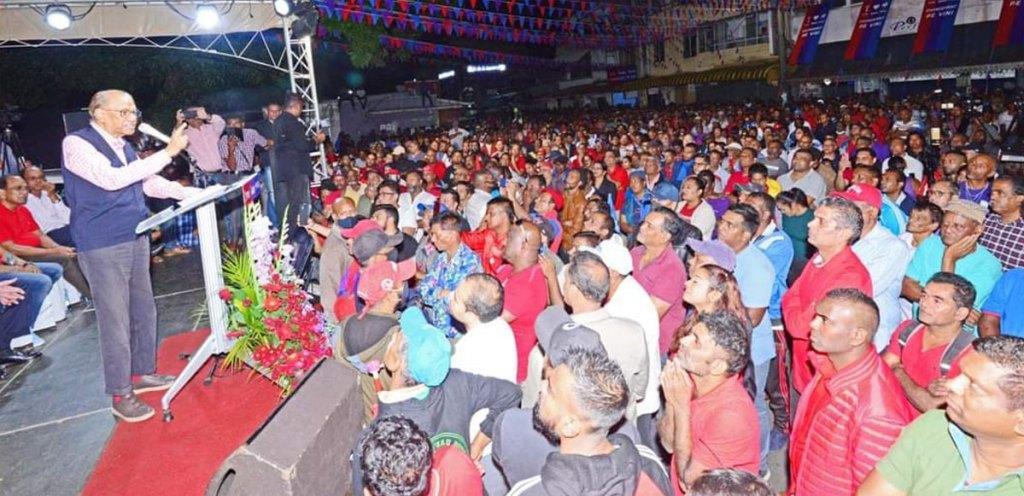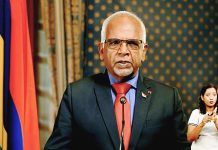Africa-Press – Mauritius. Over the past two weeks, we have seen significant political developments at the local level. The congress of the PTr-MMM-PMSD alliance held in Flacq attracted a large crowd, as did those of Mare d’Albert and Vacoas.
But it remains difficult to gauge the true popularity of this alliance, the composition of which, the “front bench” and the program that will be proposed are not yet known. The alliance is continuing its tour of the country, focusing on the organization of its next congress, which will be held in the Port Louis regions.
In such a situation, it is the government which always seems to occupy the political space in recent times, notably with two strong decisions announced in the space of a few days.
First of all, the prices of gasoline and diesel were revised upwards last Saturday. We learn that it is the global situation which dictated this increase, to offset the risk of a deficit of nearly Rs 6 billion in the coffers of the STC.
Indeed, the price of Brent, which was around $70 per barrel in June, has seen a clear increase in recent weeks to reach $90 last September. According to the authorities concerned, a repercussion of this increase on prices at the pump had thus become inevitable.
The question was one of “timing”. Was the government going to choose not to increase prices at the pump in view of a possible election before the end of the year? Clearly, this was not the case.
Moreover, immediately, to celebrate World Day of Older Persons, PravindJugnauth brought together several thousand people at the Swami Vivekananda Conference Center in Pailles.
Many observers thought that the Prime Minister would announce that his government would increase the old age pension to Rs 13,500 as had been announced for some time. It was nothing of the sort.
PravindJugnauth took the opportunity to attack the opposition by asserting that his government gave a privileged place to the elderly unlike the opposition which, according to him, had gone as far as the Privy Council to contest the promise of an increase in the old age pension.
In any case, it seems clear that the general elections are not coming soon. The Prime Minister will give himself another year to bring projects to fruition before calling the country to the polls.
There will also be a budget between now and then – which we are guessing is truly electoralist – probably more electoralist than we could imagine. In the meantime, we can see that things have been particularly calm for several days.
Even the media and, in particular, the radio stations which are normally fond of daily political broadcasts, have been extremely discreet for some time.
Fewer attacks on the government, no more “whistleblowers” and other politicians who announce political tsunamis all the time, just information relays that are as quiet as possible. However, we remain in a particularly sensitive phase.
On the one hand, the parliamentary opposition parties joined forces thinking that the general elections were close and, on the other hand, the government is taking its time and showing no desire to disrupt its schedule.
There obviously remains the case of the Privy Council, whose verdict is imminent. The events of this weekend suggest that the Prime Minister is extremely confident about the outcome of the case before the Law Lords.
We can easily imagine what it will be in terms of political “boost” and room for maneuver in the event that there is a victory for Pravind Jugnauth in this affair. The opposition parties, united in an alliance concluded too hastily, will have to reassess their political strategy.
How will they occupy time and political space effectively and constructively in a situation where PravindJugnauth holds all the key cards? The future will tell us soon enough.
Vivek Johri on information We now know Kumaresan Ilango’s replacement as ‘National Security Advisor’ at the Prime Minister’s Office (PMO). This is Vivek Johri, a veteran of the Indian intelligence services.
Known to be a discreet man, Vivek Johri has extensive experience in his field having notably been posted in Nepal. He is particularly familiar with the problems posed by Chinese ambitions and we guess that this is the reason why he was appointed to the PMO in Mauritius.
Some Mauritians find it shocking that it is an Indian citizen who occupies this extremely sensitive position for the security of our country. There are several reasons for this. First of all, the position of National Security Advisor has been held by an Indian since 1983.
This is an agreement between India and Mauritius, which was put in place following Operation Lal Dora which was endorsed by Indira Gandhi to support the then Prime Minister Anerood Jugnauth.
Operation Lal Dora aimed to position Indian military ships off the coast of Mauritius in order to prevent a “showdown” between Anerood Jugnauth, on one side, and Paul Bérenger, on the other.
The Indian army did not need to intervene at the time, but an agreement was still finalized between India and Mauritius so that the position of ‘National Security Advisor’ would be occupied by an Indian.
This testifies to the privileged relationship that has existed between India and Mauritius for decades, and the presence of Mauritius in the Indian sphere of influence will only deepen over the years (without Mauritius denying its other friendly countries).
So why do we need a foreigner to fill this position? Is it only a question of friendship with India? We recognize here a pragmatism which is specific to Mauritian governance.
In reality, it is not an ideological or identity choice, but a very real pragmatism. The position of National Security Advisor is extremely sensitive, and requires skills that go far beyond a simple understanding of the security of Mauritius.
When we talk about the security of Mauritius territory, we are talking about the security of an area of almost 1.9 million km2 in an extremely sensitive region for world security. We need international expertise in this area, and Indian intelligence officers are among the most capable in the world.
These services also work in conjunction with most intelligence services around the world, which allows Mauritius to benefit from much more complex and extensive “networks” than if we were to develop our own intelligence capabilities.
But beyond that, there is another reason for the fact that it is a foreigner who occupies this position, a reason which reveals the very degree of doubt that each Mauritian can have towards his neighbor.
In a country where you can be Muslim before being Mauritian, where you can be Hindu before being Mauritian, where you can be Catholic before being Mauritian, perhaps we should leave a position as sensitive as that of ‘National Security Advisor’ to a foreigner who is outside the games of interest and community or communalist or ethnic lobbies.
For More News And Analysis About Mauritius Follow Africa-Press







